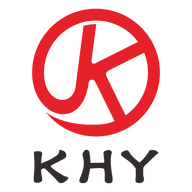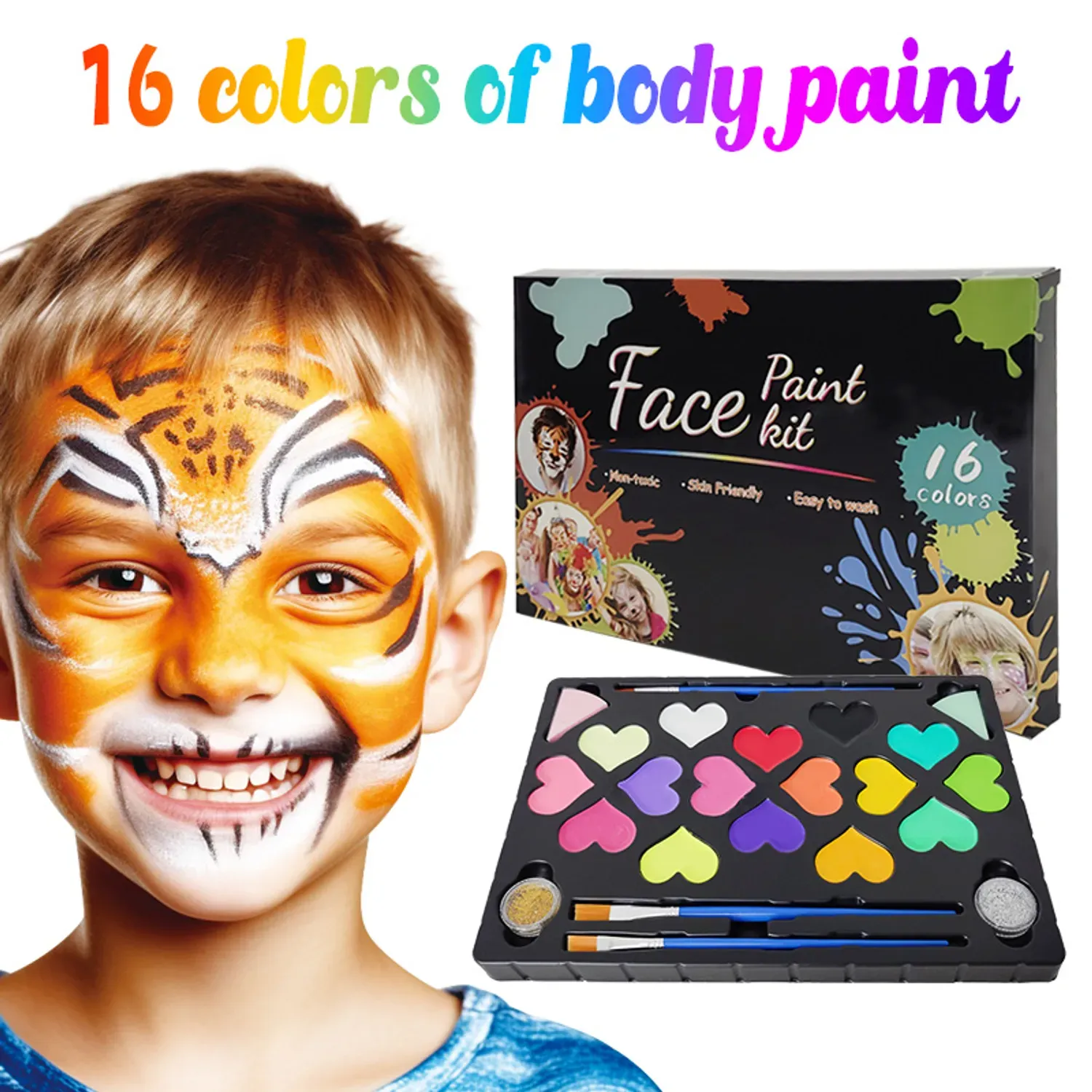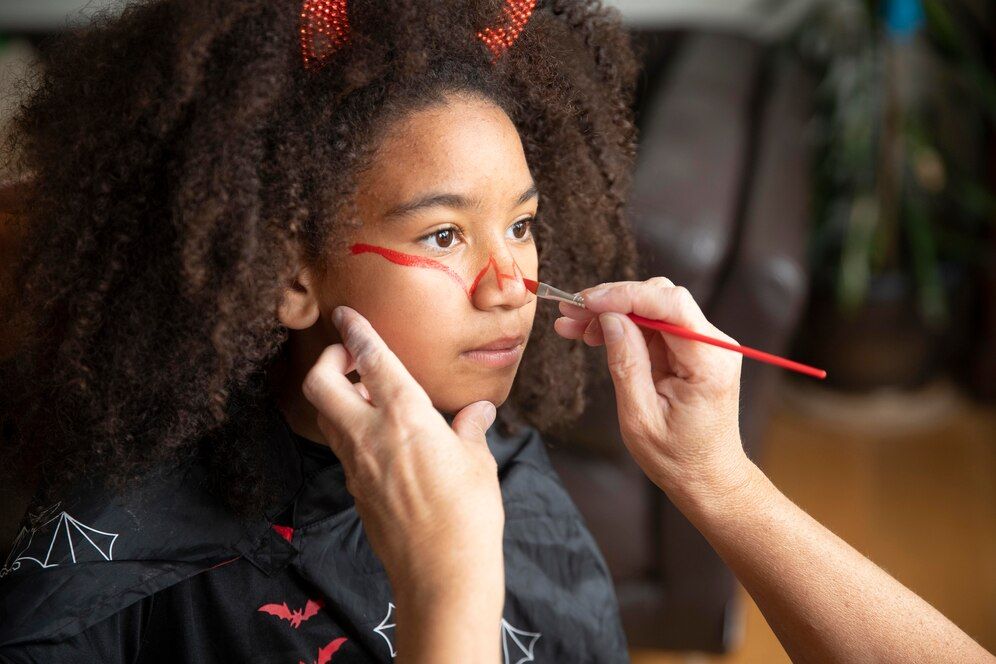betty@kaihong888.com

Get A Quote
What to Do If You’re Allergic to Face Paint?
Face paint can add a splash of color and creativity to any event, be it a birthday party, a festival, or a themed celebration. However, for some people, face paint can lead to unexpected allergic reactions. If you’re allergic to face paint, it doesn’t mean you have to miss out on the fun. In this blog post, we’ll explore what to do if you’re allergic to face paint and provide tips on how to enjoy face painting safely. We’ll also delve into some alternatives and precautions to ensure you have a great time without compromising your skin health.
Understanding Face Paint Allergies
What Causes Allergic Reactions to Face Paint?
Face paint allergies can be caused by various ingredients used in the paints. Common allergens include certain dyes, preservatives, fragrances, and other chemicals. If you’re allergic to face paint, your skin may react to these substances, leading to symptoms such as itching, redness, swelling, or even more severe reactions like hives and blisters.
Identifying an Allergic Reaction
It’s crucial to recognize the signs of an allergic reaction to face paint. Symptoms can vary but often include red, itchy, or swollen skin, rash or hives, blisters or sores, and dry, cracked skin. If you notice any of these symptoms after using face paint, it’s essential to take action immediately to prevent further irritation.
What to Do If You’re Allergic to Face Paint
Immediate Steps to Take
As soon as you notice any signs of an allergic reaction, wash off the face paint thoroughly with gentle soap and water. Avoid scrubbing, as this can aggravate your skin further. To reduce swelling and soothe your skin, apply a cool, damp cloth to the affected area. This can provide immediate relief from itching and discomfort. Over-the-counter hydrocortisone cream can help reduce inflammation and itching; apply it as directed on the package. Oral antihistamines can help control allergic reactions. Medications like diphenhydramine (Benadryl) can alleviate symptoms quickly.
When to Seek Medical Attention
If your reaction is severe, or if symptoms persist despite home treatment, seek medical attention promptly. Signs of a severe reaction include difficulty breathing, swelling of the face or throat, and severe hives or blisters. In such cases, it’s important to consult a healthcare professional to receive appropriate treatment.
Preventing Allergic Reactions to Face Paint
Choosing the Right Face Paint
One of the best ways to avoid allergic reactions is to choose face painting kit that is less likely to cause irritation. Look for products that are hypoallergenic, fragrance-free, and made from natural ingredients. These types of face paints are often gentler on the skin and formulated to minimize the risk of allergic reactions.
Conducting a Patch Test
Before applying face paint to your face, conduct a patch test. Apply a small amount of the paint to a discreet area of your skin, such as the inside of your wrist. Wait 24 hours to see if any reaction occurs. If you experience any irritation, do not use the product on your face.
Reading Labels Carefully
Always read the labels of face paint products. Look for any ingredients you know you’re allergic to and avoid products containing those substances. If the ingredient list is not clear, reach out to the manufacturer for more information.
Alternatives to Traditional Face Paint
Natural and DIY Face Paints
If you’re allergic to commercial face paints, consider making your own using natural ingredients. DIY face paints can be made from household items like cornstarch, flour, food coloring, and natural oils. This way, you can control what goes into the paint and avoid any allergens.
Face Paint Stamps and Stickers
Face paint stamps and stickers are a great alternative for those with allergies. They provide the same colorful and fun effect without direct application of paint to your skin. Ensure that the adhesive used in the stickers is also safe for sensitive skin.
Henna and Temporary Tattoos
Henna and temporary tattoos are other creative alternatives to face paint. Henna, made from the leaves of the henna plant, is natural and typically safe for most skin types. However, ensure that the henna you use is free from additives like PPD (para-phenylenediamine), which can cause allergic reactions.
Fun Without the Face Paint
Embrace Costumes and Accessories
If face paint is not an option, there are plenty of other ways to get into the spirit of the event. Costumes, masks, and accessories can add a fun and festive touch without the risk of an allergic reaction.
Creative Makeup Alternatives
Use regular hypoallergenic makeup products to achieve a similar effect to face paint. Eyeshadows, eyeliners, and lipsticks can be used creatively to design unique and colorful looks. Make sure to choose products that are safe for your skin type.
FAQs About Face Paint Allergies
Can you suddenly become allergic to face paint?
Yes, it’s possible to develop an allergy to face paint even if you’ve used it before without any issues. Allergies can develop over time due to repeated exposure to certain allergens.
What should I do if my child is allergic to face paint?
If your child shows signs of an allergic reaction to face paint, follow the immediate steps mentioned earlier: remove the paint, apply a cool compress, and use anti-inflammatory creams or antihistamines as needed. Ensure that any face paint products used in the future are hypoallergenic and conduct a patch test beforehand.
Are there any long-term effects of face paint allergies?
Most allergic reactions to face paint are temporary and resolve once the allergen is removed. However, severe or repeated reactions can lead to more persistent skin issues, so it’s important to avoid exposure to known allergens.
Conclusion
If you’re allergic to face paint, there are still plenty of ways to enjoy the vibrant and creative world of face painting without risking your skin health. By understanding what causes allergic reactions, taking immediate action when symptoms arise, and choosing safe alternatives, you can participate in face-painting fun safely. Whether you opt for hypoallergenic face paints, DIY alternatives, or creative makeup options, you can still create memorable and colorful looks for any occasion. Always prioritize your skin’s health and well-being, and don’t let allergies hold you back from expressing your creativity.
For those looking for the best hypoallergenic face paints and skin-safe products, consider exploring KHY’s wide range of high-quality, allergy-friendly options. KHY offers a variety of DIY face painting kits that are formulated with natural ingredients, free from common allergens, and designed to be gentle on sensitive skin. By choosing KHY, you can enjoy the fun of face painting with peace of mind, knowing that your skin’s health is protected. Visit KHY to discover more and make your next face painting experience safe and enjoyable.

